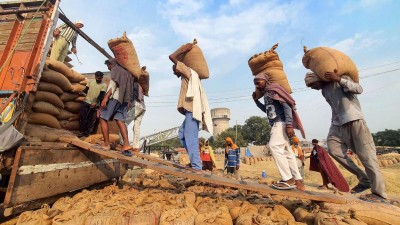The information you've provided outlines the recent developments in the trade of rice between India and Nepal. Here is a summary:
Export Ban and Subsequent Quota:
- The Indian government imposed a ban on the export of non-basmati rice on July 20, affecting the supply to Nepal.
- Later, on October 18, the Indian government announced the allocation of 95,000 tonnes of non-basmati white rice to Nepal.
Coordination with Indian Suppliers:
- The Nepal government has instructed private importers to coordinate with the state-owned National Cooperative Exports of India for the rice import process.
Import Quotas for Private Firms:
- Nepali private-sector importers are limited to importing up to 5,000 tonnes of rice on a first-come, first-served basis.
- The Ministry of Industry, Commerce and Supplies aims to prevent cartelization by setting this quota.
Allocation of Rice Imports:
- Out of the 95,000 tonnes, 30,000 tonnes will be imported by government corporations, while the remaining amount will be imported by private-sector suppliers.
Reasons for Indian Export Ban:
- India imposed the export ban on non-basmati rice in response to the need to maintain its food reserve amid the threat of El Niño disruptions.
Impact on Nepal:
- Nepal heavily depends on rice imports from India, and the export ban led to a rise in rice prices in Nepal.
- Despite having adequate inventory, traders increased prices in response to the ban.
Rice Imports from India to Nepal:
- In the 2021-22 fiscal year, Nepal imported 1.4 million tonnes of rice from India, the highest on record.
- After the export ban, rice imports dropped to 812,028 tonnes in 2022-23.
Rice Smuggling Concerns:
- Reports suggest a surge in rice smuggling from India to Nepal since the export ban.
- Villagers along the India-Nepal border are reportedly involved in smuggling rice into Nepal.
Other Export Controls by India:
- India has also imposed controls on sugar, wheat, rice, and onions to manage domestic supplies and prices.
Global Context:
- India, as the world's largest rice exporter, plays a significant role in global rice markets.
- The export ban contributes to concerns about rising food prices, exacerbated by other global events like Russia's invasion of Ukraine.
